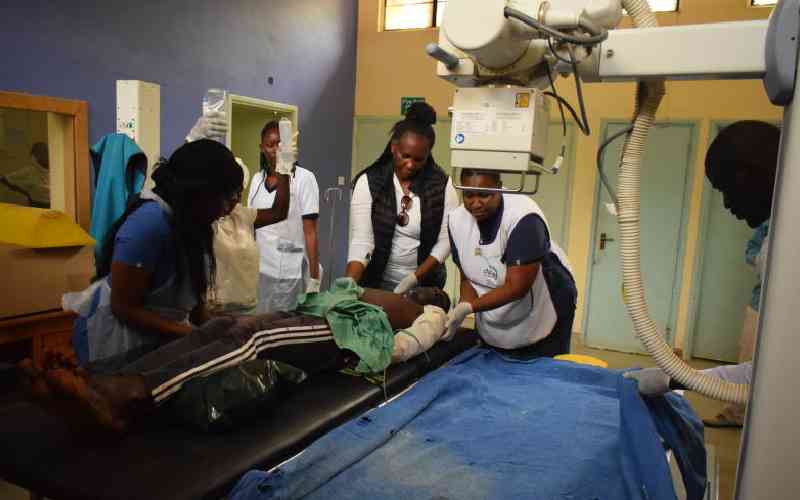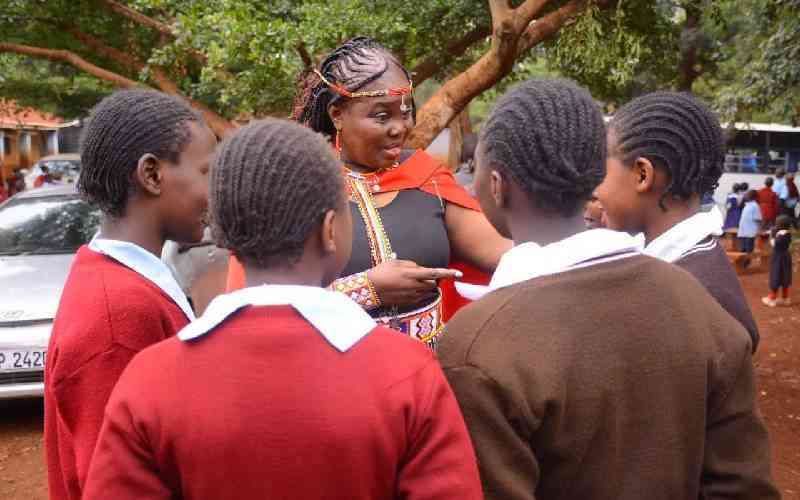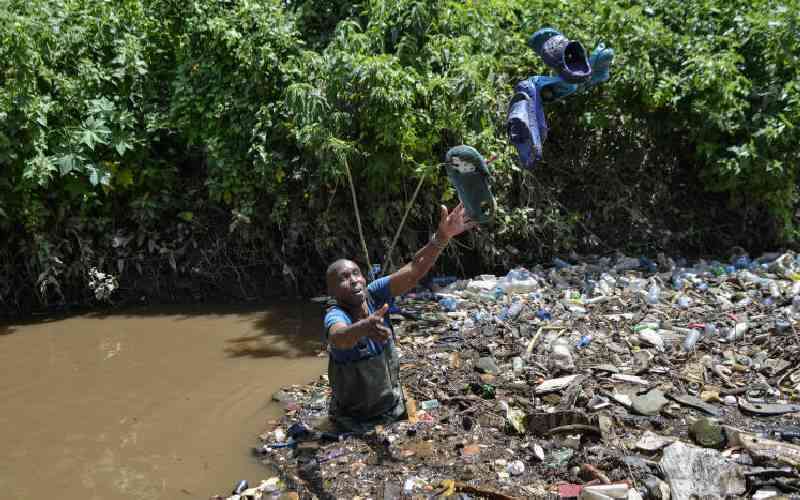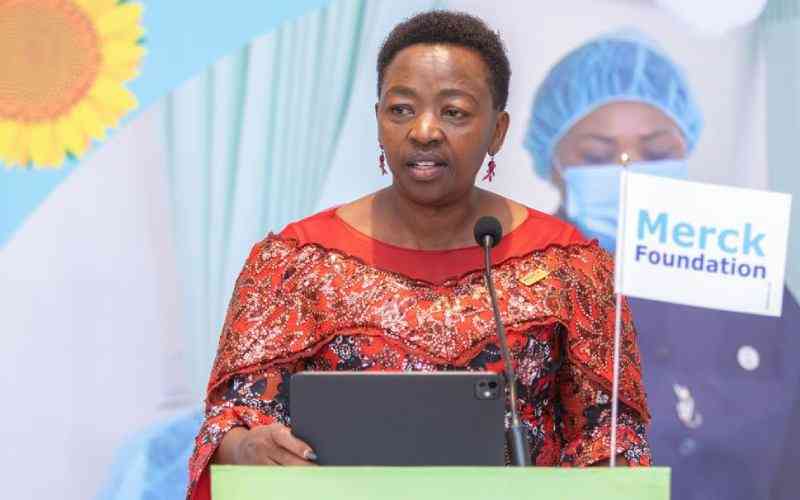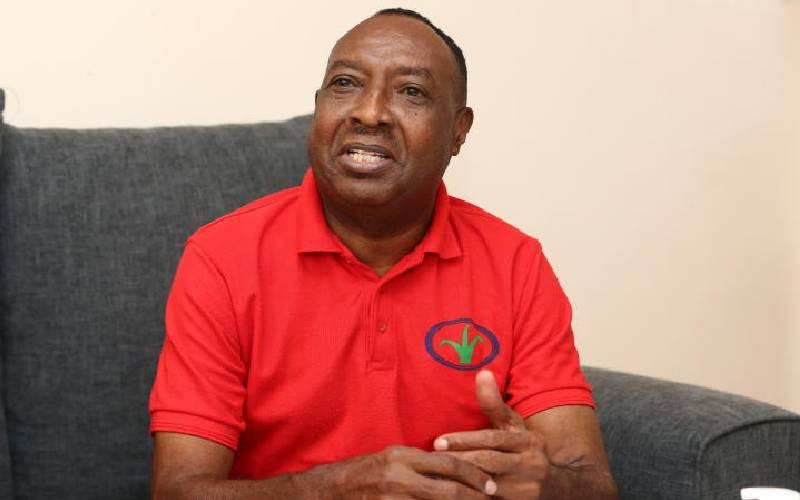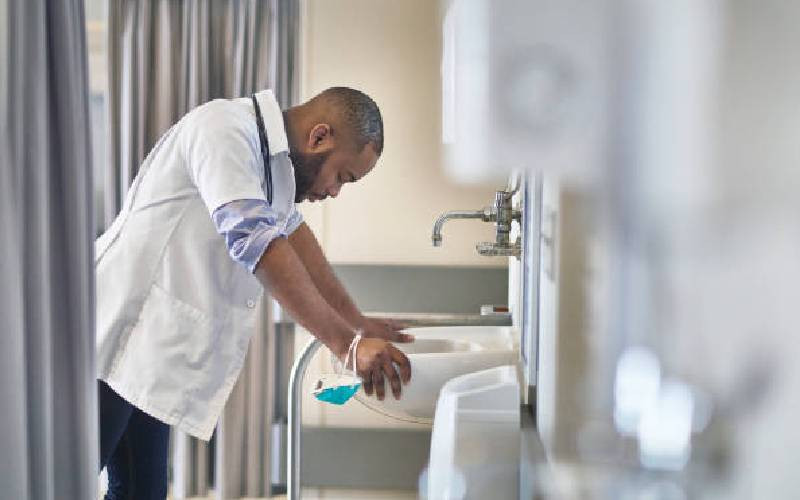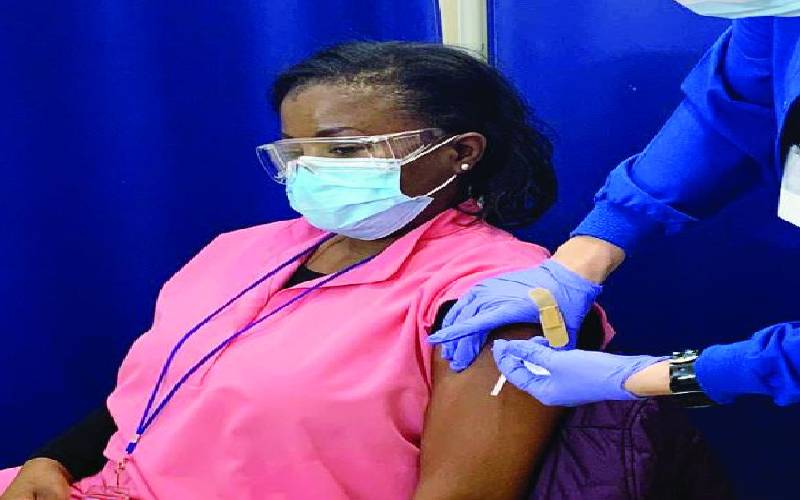
Dr Tanya, an assistant Prof in Pediatrics Infectious Disease at Mt Sinai receives Covid-19, Moderna vaccine in NYC. [Courtesy]
Health workers have expressed mixed feelings towards the uptake of the Oxford/AstraZeneca vaccine as Kenya starts a vaccination programme.
About one million doses of the Covid-19 vaccine are expected into the country today.
The first batch of 495,000 doses will be distributed to regional depots, Level VI hospitals and Military Level IV hospitals. The second batch will contain 525,000 doses.
Goody Gor, an official of Kenya Medical Practitioners, Pharmacists and Dentists Union (KMPDU), said she is reluctant to receive the vaccine, over claims that its efficacy has not been determined.
Dr Gor said more research on the vaccine is still being done.
She noted that individuals who receive the jab have to stay indoors because they are susceptible to infection.
“I am hesitant to take the jab because it does not prevent me from contracting the virus, and I can as well infect the masses,” said Gor.
STOP THE SPREAD
The doctor added that even with the vaccine, the public still have to wear masks, and observe Covid-19 preventive measures.
“Why should I get a vaccine yet I am still at risk of getting the virus. I am still trying to understand more about this vaccine and the virus before I get injected,” she said.
Health care and frontline workers including security personnel and teachers are among those to receive the vaccine.
Were Onyino, the president Kenya Medical Association attributed hesitancy among healthcare professionals to lack of adequate stakeholder involvement and public education on importance and safety of the vaccine and its rollout.
For instance, the Covid-19 taskforce committee led by Dr Willis Akhwale does not have a representative of frontline health workers.
“KMA was not properly engaged to give an expert opinion. This is why there might be some hesitancy,” Dr Onyino told The Standard.
He however said the association is ready to work with the government for smooth rollout of vaccination programme.
“We are ready to support the government, to help stop the spread of the virus. Leaders should also take part in convincing the public,” Dr Onyino said.
Peterson Wachira, the chair of Kenya Union of Clinical Officers, also said they have not been engaged on the vaccine.
Wachira explained that it is paramount to sensitise medics on the programme as they are key in administering the jab.
“Not all health care workers have accurate information about the vaccine yet they are expected to help the public understand more about it,” said the official.
Wachira said questions to be addressed are the safety of the vaccine, why it has taken a shorter time to develop and released and what procedure was followed during trials.
“There are questions to be answered before I get vaccinated.
Alfred Obengo, the president of National Nurses Association of Kenya said they have been kept in the dark on the vaccine.
Obengo admitted that the association held two meetings with the Health Cabinet Secretary Mutahi Kagwe who promised to have all health care providers engaged but this has not happened.
“Health care workers have not been engaged and that is why there is reluctance.
"The public are also asking about the efficacy of the vaccine, but we do not have answers,” he said.
The Kenya Obstetrical and Gynecological Society president-elect Kireki Omanwa attributed the reluctance to lack of accurate information on the virus and the vaccine.
Dr Omanwa said political leaders should be vaccinated first to inspire confidence among Kenyans.
“There is hesitancy due to lack of information that the vaccine has been proven safe and effective.
"Those vaccinated should share information with others and our leaders should spearhead the programme,” he said.
He added that different countries have produced the vaccine in the USA, UK and Russia where experiences should be shared among Kenyans, to avert infections.
“There should not be fear in adopting the vaccine because, in order for them to be used, they undergo vigorous tests,” Dr Omanwa said.
He added: “For the vaccine to go to the market, there are different tests to know its efficacy and safety. The efficacy is 75 to 92 per cent and that is not a bad number.”
To prevent reluctance among Kenyans, he said there should be sensitisation on the side effects, information on clinical trials that guaranteed its approval, cost of the vaccine, and its effectiveness in boosting immunity.
“Global data has shown a drop in number of infections and deaths in countries where the vaccine has been adapted.
"These are reasons we need more sensitisation,” said Dr Omanwa.
But, Dr Ombeva Malande, a vaccinologist and a senior consultant in Paediatric infectious diseases said that Kenyans should develop trust in Covid-19 vaccines.
“We do not need to be worried about Oxford/AstraZeneca vaccine, but build trust in it,” he said.
Malande urged health workers’ associations and unions to help fight hesitancy.
He noted that there might be some side effects with administration of the vaccine.
“There are some effects like swelling of areas where the vaccine is administered, some patients may experience pain, tiredness and allergic reactions. These are effects that can be handled,” Dr Malande said.
The Kenya National Union of Teachers Secretary General Wilson Sossion has urged teachers to acceptthe vaccine.
“I do not think the government will bring substances that have not been proven to be working. We must protect the government and the global initiative to break chain of transmission,” Mr Sossion said.
Dr Collins Tabu, Head of National Vaccines and Immunisation Programme at the Ministry of Health said: “The information we have is that the vaccine is safe, it is effective in preventing the Covid19 infection.
"We need to walk together to deploy this vaccine and take up as fast as we can to be able to protect ourselves and ensure the continued functioning of the critical sectors of our economy, protect most vulnerable people so that we can reduce the burden of the disease and deaths.”
 The Standard Group Plc is a multi-media organization with investments in media platforms spanning newspaper print
operations, television, radio broadcasting, digital and online services. The Standard Group is recognized as a
leading multi-media house in Kenya with a key influence in matters of national and international interest.
The Standard Group Plc is a multi-media organization with investments in media platforms spanning newspaper print
operations, television, radio broadcasting, digital and online services. The Standard Group is recognized as a
leading multi-media house in Kenya with a key influence in matters of national and international interest.

